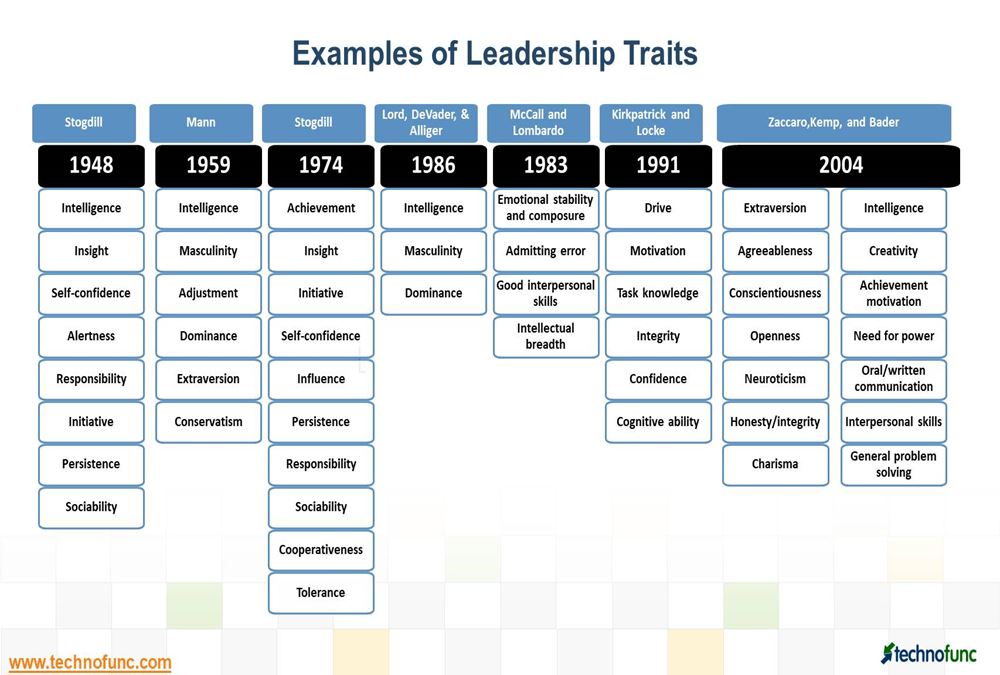- Home
- Business Processes
- Industry Knowledge
- Aerospace Industry
- Automotive Industry
- Banking Domain
- BFSI Industry
- Consumer/ FMCG Industry
- Chemicals Industry
- Engineering & Construction
- Energy Industry
- Education Domain
- Finance Domain
- Hospitality Domain
- Healthcare Industry
- Insurance Domain
- Retail Industry
- Travel and Tourism Domain
- Telecom Industry
- Leadership Skills
- eLearning
- Home
- Leadership Skills
- Leadership Theories
- Trait Theory of Leadership
Trait Theory of Leadership
Trait Theory of Leadership is based on the assumption that people are born with inherited traits and some traits are particularly suited to leadership. The theory aims to discover specific leadership & personality traits and characteristics proven to predict the likelihood of success or failure of a leader.
What are Personality Traits?
The trait approach to personality is one of the major theoretical areas in the study of human personality and is focused on differences between individuals. The trait approach was one of the first systematic attempts to study leadership. The combination and interaction of various traits forms a personality that is unique to each individual. Trait theory is focused on identifying and measuring these individual personality characteristics known as Traits.
Traits: Also called dispositions, Traits can be defined as habitual patterns of behavior, thought, and emotion. Traits are relatively stable over time, differ across individuals and influence behavior. Traits are external behaviors that emerge from internal beliefs and processes.
What is Trait Theory of Leadership?
Trait Theory of Leadership is based on the assumption that people are born with inherited traits and some traits are particularly suited to leadership. People who make effective leaders have the right (or sufficient) combination of traits and great leaders has some common personality characteristics. Trait theories help us identify traits and dispositions that are helpful when leading others. This theory as described by Kelly (1974) attempts to classify what personal characteristics such as physical, personality and mental, are associated with leadership success. Trait theory relies on research that relates various traits to the success of a leader.
Quotes on Traits:
“Leadership consists not in degrees of technique but in traits of character; it requires moral rather than athletic or intellectual effort, and it imposes on both leader and follower alike the burdens of self-restraint.” - Lewis H. Lapham
“The screenwriters I know share a few personality traits and one of them is anxiety.” - Tony Gilroy
“I think in the end, when you're famous, people like to narrow you down to a few personality traits. I think I've just become this ambitious, say-whatever's-on-her-mind, intimidating person. And that's part of my personality, but it's certainly not anywhere near the whole thing.” - Madonna Ciccone
“The moment a person forms a theory, his imagination sees in every object only the traits which favor that theory” - Thomas Jefferson
Overview of Trait Theory of Leadership:
Early research on leadership was based on the psychological focus of the day, which was of people having inherited characteristics or traits. The trait theory of leadership focused on analyzing mental, physical and social characteristic in order to gain more understanding of what is the characteristic or the combination of characteristics that are common among leaders. There have been many different studies of leadership traits and attention was put on discovering these traits, often by studying successful leaders, but with the underlying assumption that if other people could also be found with these traits, then they, too, could also become great leaders.
Advantages of Trait Theory of Leadership:
The trait theory is naturally pleasing theory and gives constructive information about leadership. Lot of research has validated the foundation and basis of the theory and it can be applied by people at all levels in all types of organizations. Managers can utilize the information from the theory to evaluate their position in the organization and to assess how their position can be made stronger in the organization. It serves as a yardstick against which the leadership traits of an individual can be assessed and individuals can get an in-depth understanding of their identity and the way they will affect others in the organization. This theory makes the manager aware of their strengths and weaknesses and thus they get an understanding of how they can develop their leadership qualities. It gives a detailed knowledge and understanding of the leader element in the leadership process.
Examples of Leadership Traits:
A lengthy list of traits has been made to describe an effective leader in terms of certain characteristics. Given below is outcome of studies on leadership traits and characteristics with reference to timelines in terms of years:

Criticism / Arguments against - The Trait Theory of Leadership:
Many arguments are made against the leadership theory of traits and it has some inherent limitations as during the 1930s the field of Psychometrics was in its early years. The greatest argument is that if particular traits are key differentiator of leadership, then how do we explain people who possess these qualities but are not leaders? This question is one of the difficulties in using trait theories to explain leadership.
These characteristics according to some people are considered valid indicators of successful leaders, but if you compare leaders by various physical personality and intelligence traits, you may find very little agreement on these. Some findings point out to the fact that leaders are intelligent individuals. But they do not provide any clue as to whether leaders are brighter than their followers or are as close to them in intelligence.
This theory is quite complex and there is bound to be some subjective judgment in determining who is regarded as a ‘good’ or ‘successful’ leader and many of these factors are situational related factors. The followers have a significant effect on the job accomplished by the leader. Trait theory completely ignores the followers and the situations that also help a leader to be successful. To be more objective, traits of the person as well as demand of the situation together determine the effectiveness of the leader.
Some of the personality traits are overlapping with each other. Therefore, you need to be cautious in stating, personality or any other characteristic as a cause of successful leadership. You must ask the questions: Who is a successful leader? Is he far superior physically? Is he far brighter? Is he more mature as a person? Is he more motivated to achieve his goal? Does he have more consideration for his followers? Etc.
Moreover the list of possible traits tends to be very long and personality traits measurement weren't reliable across studies. More than 100 different traits of successful leaders in various leadership positions have been identified. These descriptions are simply generalities and there exists disagreement over which traits are the most important for an effective leader. This theory does not offer explanations between the relation of each characteristic and its impact on leadership. Some of the traits may describe a successful leader but predicting successful leaders on the basis of traits alone is not a correct approach.
Stogdill in 1948, suggested that no consistent set of traits differentiated leaders from non-leaders across a variety of situations implying that an individual with certain traits who has been successful in one situation might not be as effective in another situation and this led to researchers concluding that traits were to be considered as relative to the requirements of the situation.
Related Links
You May Also Like
-
According to Environmental theories of leadership, a leader needs to deal effectively with environmental complexities and lead in a certain style as a result of environmental responses. Environmental influenced leadership demand leaders to learn how to adjust environmental factors. Leaders also have the responsibility of creating the right kind of environment for their followers by focusing on environmental factors and pressures.
-
There are four characteristics of leadership that help us to understand the character of leadership as a concept. 1. Leadership is a process, 2. Leadership involves influence, 3. Leadership always occurs in a group context and 4. Leadership involves goal attainment. These are the four components that make up the character of the 'leadership' term and help us to define the leadership concept. All of these components of leadership have common characteristics.
-
Generating Ideas using Brainstorming
The brainstorming technique was developed by Alex F. Osborn in 1957 and brainstorming means where a team of members generates a large amount of alternative fruitful ideas on a specific problem without any criticism and then evaluates each idea in terms of their pros and cons. Brainstorming techniques fall into four broad categories: visioning, exploring, modifying, and experimenting.
-
Participative Leadership Theories
Participative leadership theories rely on the involvement of different participants and suggest that the ideal leadership style is one that takes the inputs of others into account. Participative leaders encourage participation and contributions from group members and involve them in the decision-making process. Participative leadership tries to achieve through people, teamwork and collaboration.
-
McClelland's Theory of Needs is a human motivation theory which states that an individual's specific needs are acquired over time through our culture and life experiences. As per the three needs theory, these acquired needs significantly influence the behavior of an individual. The three main driving motivators are the needs for achievement, affiliation, and power.
-
Communication has as its central objective the transmission of meaning. The process of communication is successful only when the receiver understands an idea as the sender intended it. How does a message or an idea travel from one person to another? To transmit our message, we engage in a sensitive and complex process of communication, with different elements like sender, message, channels, receiver, noise, and feedback.
-
Early studies on leadership were done at Ohio State University using the Leader Behavior Description Questionnaire to identify the leader's observable behaviors. Ohio State study on leadership found two behavioral characteristics of leadership - people-oriented (consideration) and task-oriented (initiating structure) leadership style.
-
Management theories are the recommended management strategies that enable us to better understand and approach management. Many management frameworks and guidelines were developed during the last four decades.
-
In this study of power, Raven identified five bases of power as coercive, reward, legitimate, referent, and expert. The 5 Types of Power can help you decide when it is appropriate to use a particular type of power in important situations. Leadership involves authority and it is very important for leaders to understand what type of power they're using.
-
Humanistic theories of Leadership
Humanistic leadership is an ethical philosophic approach that recognizes the dignity and worth of each and every group or team member. This approach is based on building a leadership culture of trust, ethics, and empathy. Humanistic leadership is a set of principles founded on humanism with vision, mission, values, and expected behaviors. It is value-driven leadership based on principles such as humility, accountability, positivity, and love.
Explore Our Free Training Articles or
Sign Up to Start With Our eLearning Courses

About Us
Learning
© 2023 TechnoFunc, All Rights Reserved










